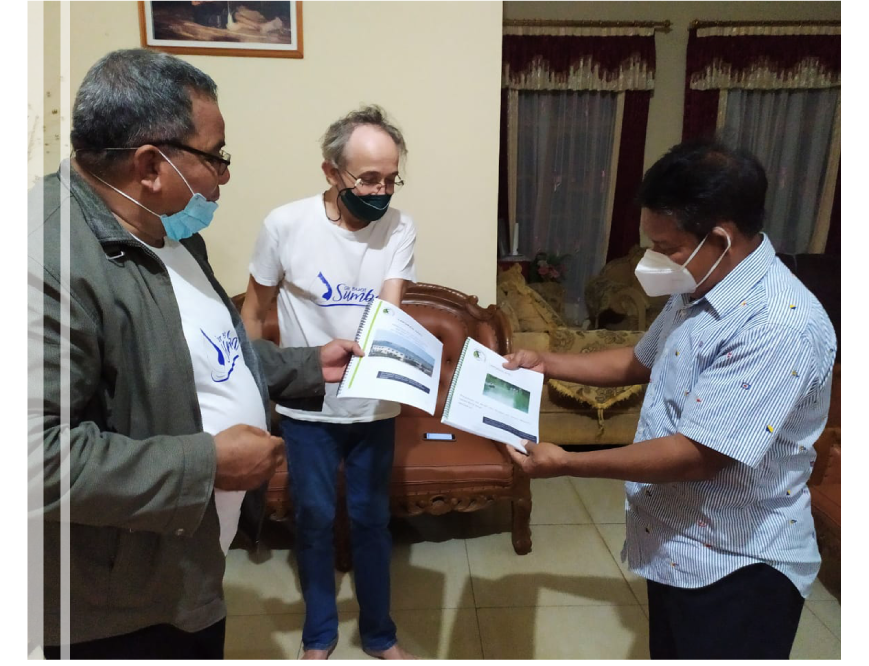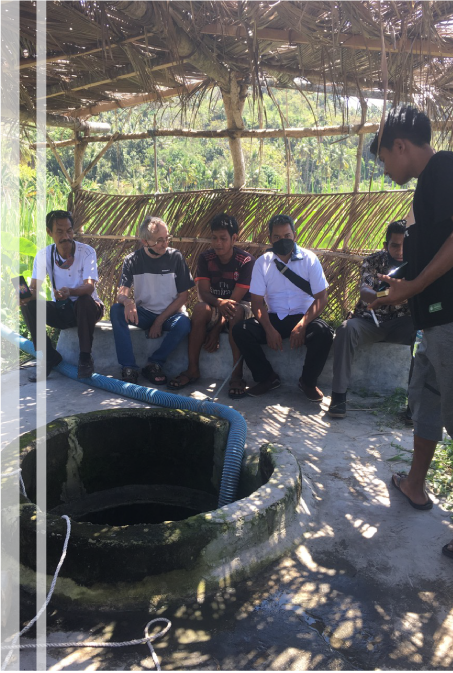ANDRE GRAFF RETURNS TO SUMBA
Back to the well !
In 2018, when I was living in Indonesia as an expat, I had the pleasure to interview André Graff for a Jakarta magazine Le Petit Journal. Since the very first wells dug in with the island’s inhabitants, André’s constant goal has been to ensure the sustainability of his project through the transmission of his knowledge of the construction of new wells and the maintenance of the installations. For the last several years since building 42 wells and 8 water distribution systems”hydraulique villageoise”* in Sumba which profoundly changed the lives of tens of thousands of people on the island, André has been busy with shaping this transmission.
André left Sumba in February 2020 for France in order to reconnect with his sponsors and look for a new health insurance solution, and only set foot Indonesian soil again on July 1st 2021, a deadly virus having upset lives and plans of everyone in the meantime After 6 days of mandatory isolation in a hotel in Jakarta followed by 6 weeks stuck in Bali, he is now been back in Sumba and as you may imagine, he is very happy to finally resume his activities. His return is the opportunity to take stock on what happened since this last interview and discuss his future plans…

Anne Suchanecki: Hello André, apa kabar ? (how are you?) You just arrived in Sumba after many COVID-related adventures . How were your different lockdown periods in Indonesia ?
André Graff : not bad at all ! First, I had the big advantage to get a complete vaccination before leaving so I was not too worried about exposure. As far as isolation in Jakarta was concerned, I had the good instinct to dip into my savings in order to be in a fairly good hotel, quiet and with a good internet connection. I therefore could recover from my jet lag while reconnecting locally. And being stuck in Bali due to lack of connecting flights to Sumba allowed me to see my friends again and tweak my plans
Anne Suchanecki: In almost 18 months not only Sumba has been through COVID as everywhere, but it also endured natural disasters in the spring of 2021 (Seroya typhoon in April). How did you find the island on your return?
André Graff :Luckily West Sumba, the biggest part of the island where we built wells and water distribution systems, was spared from the typhoons, floods and landslides. The Eastern part of the island however, was much more damaged; among others a bridge connecting North and South of the region had to be rebuilt.
As for Covid, without any doubt the populations were left much more anxious than before. Going in and out of Sumba is now more difficult as connecting flights with Bali were drastically reduced. As expected, tourism in Sumba was extremely heavily impacted; only several high end exclusive resorts have been able to fly their guests in by private jet which contributed to further deepen the gap between the numerous small tourist structures (those will most probably not recover) and the rest. Of course, vaccination will only reach remote communities very late but I must say that Sumba inhabitants are used to fight all sorts of epidemics (dengue, malaria, tuberculosis ..). It is however too soon to evaluate the real devastations of Covid.
Anne Suchanecki: Since 2018 I know that you have been busy on numerous projects , can you tell me about them ?
André Graff:In addition to the repair and maintenance work on the village water systems required for each installation, we worked on a slightly different project: on Savu, a small island near Sumba, we were able to set up a plant for the phytodepuration of wastewater from a community to which we had supplied water in previous years. When I say WE I mean all the people who work along and around me, old adventure friends, especially the Indonesian foundation Sunda Islands Humankind (SIHF), Indonesians who already benefited from one of those installations, and of course the people living in the villages where the project is being conducted. Nothing gets achieved without these people !
Anne Suchanecki: What specific project were you working before you left for France ?
André Graff :We had just finished a major repair job in Kodi North Sumba, where the pump of a 10 year-old installation had broken down and water houses had to be rebuilt. At each installation we spend a lot of time explaining to all future users the importance to each pay month a fee to enable financing of the equipment, maintenance and handling of the necessary repairs. It is important that this water management is set up and handled by the community itself. Unfortunately in Kodi, the villagers did not take their fate in hand and the coffers were empty. So we had to find a sponsor to pay for a new pump. Fortunately, the Regent in charge of the region financed half of these repairs.
It’s a daily challenge to explain to people in these very remote communities that water is not a free good. When a new installation is built the villagers very enthusiastically pay regularly their monthly fee but in spite of the very modest amount, the percentage of users paying their duty falls to almost zero in less than a year . This is why all schooling and education projects are key if we want to ensure the sustainability of the installations ; without this education, we risk playing ‘firefighters’ for each repair which then becomes an emergency in terms of labor and money.
But we also sometimes have very nice surprises which strengthen the confidence in the work we do : for example in Lamboya new houses were built ; the newly arrived inhabitants wanted to move to a village already equipped with water distribution! Yes, water is source of life and water attracts life too! The three families may be “climate migrants” but they are very happy with their choice.
Lastly among those beautiful surprises I found “my” village cleaner than ever : sufficient water in a village also means learning (at last made possible) cleanliness and hygiene.

Anne Suchanecki : Now that you are back in Sumba you can move on your long term projects such as those which led to your remittance of the Acquassistance reports to the Regent of West Sumba 10 days ago. Could you explain what these projects are ?
André Graff : A mission we conducted in Savu in 2018 (waste water sanitization) gave me the opportunity to meet Claude Mauvais, a highly qualified and seasoned engineer in water installations. Claude immediately got interested in what we were doing in Sumba and as soon as our job on Savu was completed he came back with me. This is how he came to suggest surveying two projects : one, a School for Water and the other, the pumping of a lake to bring drinkable water to the inhabitants of Tambolaka in North Sumba. The field studies were done end of 2019 in partnership with Acquassistance whose Executive Officer Philippe Folliasson I met back in 2009. Acquassistance is the Suez Group’s association where active and retired employees work together on international solidarity projects. As such they have a lot of experts on hand.
With the Covid situation the reports were only recently translated into Indonesian and this gave me the opportunity to get back in touch with the Regent on my return to Sumba. His support will be very useful to drive all or part of these projects through political and logistical meanderings and get funds from the Education and Infrastructure ministries these projects depend on. Even if I already have contacts with the Infrastructures Ministry for Infrastructures, local support is not only welcome but it creates a trusting relationship which leads to a better understanding of the projects and stakes, and consequently to a significant local involvement.
And today, this trust relationship is what makes us work on a more modest water distribution system in North Sumba. The Regent himself approached me with this project.
Thanks to our Indonesian support network (Sunda Islands Humankind Foundation) we are at the stage of designing partnerships for the funding of this project. It should be pointed out that without the Regent’s local involvement, this project would cost considerably more; for example, the local
“Travaux Publics” will carry out all the securing of the point where the water will be drawn, the water and the tower supporting the solar panels.
Our new association “De l’Eau Pour Sumba” (Water for Sumba), which was set up at the beginning of this year, will bring a new dynamic to these projects and further extend the support without which nothing is possible. As for the School for Water, the scale initially considered requires numerous contacts and supports throughout Indonesia and the current situation with Covid does not even allow free travel among the islands. So for the time being, I am sort of scaling down its application and will promote the exchange of Best Practices between those who learnt the well digging techniques, the construction and maintenance of water distribution systems and those eager to learn them. Seminars combining these different actors could be a good framework for these exchanges, as well as tutorials on YouTube or other media.
In a second stage, as conditions and funding allow, we will resume and adapt the School for Water. This will be facilitated by the tools and seminars preceding this phase.
Anne Suchanecki : a lot of work ahead of you ! Beautiful projects on the horizon ! One last question before leaving : for our new readers who will discover Sumba reading this article, how would you describe this island? Of course I am interested by your personal vision not by what they could find on internet.
André Graff: Sumba is part of the Lesser Sunda Island Province and has a very hot and dry climate, especially in the North. It is somehow overlooked in terms of economic development : the first wheels (motorbikes) only appeared 50 years ago ! Life is fairly hard and Sumba is a bit like the perfect microcosm of Indonesia, with a very young population and a very late development especially in education. Nothing much moves forward in this area and in infrastructure. For several years now the Indonesian government has been trying to promote Sumba, among other islands, to reduce the permanent congestion in Bali while doing everything to copy Bali model, but there too nothing really evolves. Which, considering the current state of the Indonesian politics, is rather a good thing as in most cases tourism develops chaotically with only one target: very short term profit. Indonesia severely lacks well thought-through, socially sustainable touristic investments which benefit local populations. So today Sumba is very well preserved, but I do not know how long this will still last as the island is breathtakingly beautiful…

Anne Suchanecki : So what should we hope for Sumba ?
André Graff : I hope that Sumba ‘s entrepreneurship will continue to thrive, especially in agriculture and agronomy. A couple of days ago, I had the magnificent surprise to discover that several of my Sumba buddies who have been with me and supporting me for ages have, without talking to me, built several wells in their rice paddies following the techniques I taught them years ago. It is exactly this resourcefulness and entrepreneur- ship that I wish for Sumba.
* system which brings along the water to a village or a specific area where it is provided to the users.




